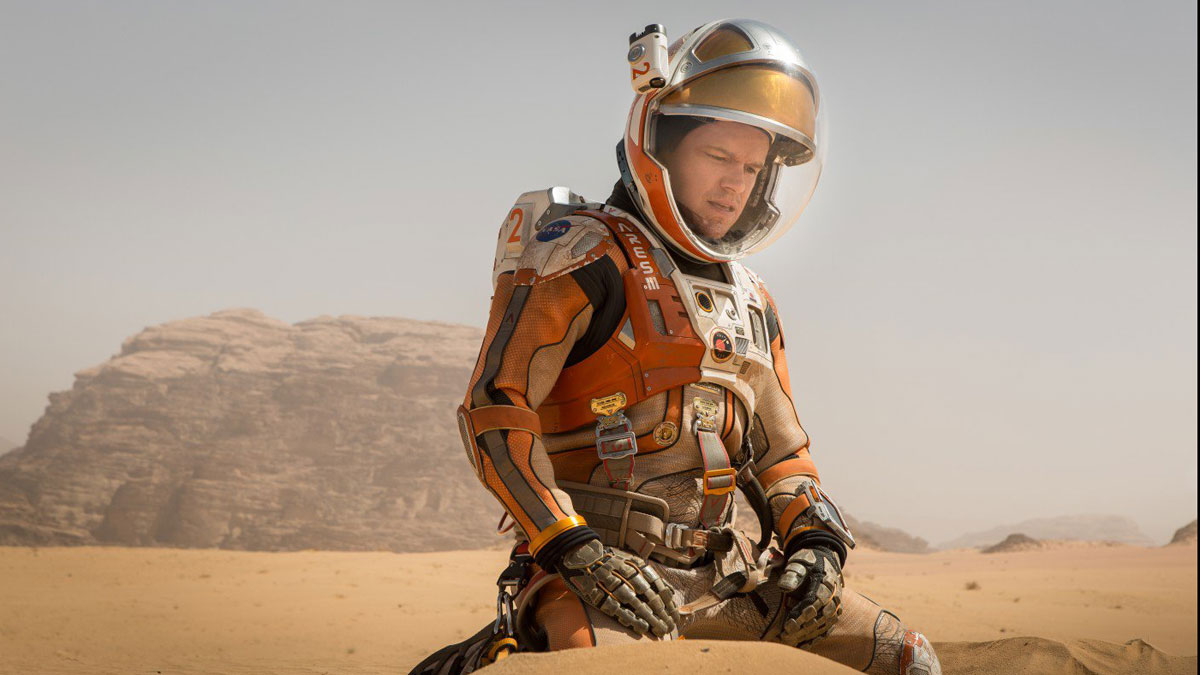The Martian: the real science behind the sci-fi thriller
Ridley Scott's lost in space film has some flaws, but could inspire future Mars travel

A free daily email with the biggest news stories of the day – and the best features from TheWeek.com
You are now subscribed
Your newsletter sign-up was successful
This week Nasa scientists announced the discovery of liquid water on Mars. The finding not only gives researchers hope of discovering some form of life on the red planet, but in an instance of extraordinarily good timing, it gives a major publicity boost to Ridley Scott's new science fiction film, The Martian, which opens in UK cinemas today.
The Martian, based on Andy Weir's novel of the same name, stars Matt Damon as an astronaut who is left behind to fend for himself on Mars after he is caught in a dust storm during a mission and presumed dead.
Scriptwriter Drew Goddard called The Martian "a love letter to science", but how accurate is the science in the movie?
The Week
Escape your echo chamber. Get the facts behind the news, plus analysis from multiple perspectives.

Sign up for The Week's Free Newsletters
From our morning news briefing to a weekly Good News Newsletter, get the best of The Week delivered directly to your inbox.
From our morning news briefing to a weekly Good News Newsletter, get the best of The Week delivered directly to your inbox.
Humans on Mars
The Martian is futuristic fiction, set in the 2030s, when Nasa astronauts are regularly travelling to Mars and living on the surface to explore. As yet, no humans have visited Mars, but Nasa is already developing many of the technologies that appear in the film, says Astronomy. NASA checked every aspect of the set and script and filmmakers used Nasa blueprints of an ion-engined Mars crew carrier to make the Hermes spacecraft depicted in The Martian.
Mars weather
In the movie, Damon's character Watney, a botanist, is stranded by a storm while out collecting samples. It's a hurricane-force blast complete with flying debris. But John Logsdon, a former director of the Space Policy Institute at George Washington University, says in The Guardian that such a storm would be unlikely, as the red planet's thin atmosphere would reduce winds to "barely a light breeze".
A free daily email with the biggest news stories of the day – and the best features from TheWeek.com
Hopping on the red planet
Lodgson has also questioned whether Damon would be able to walk on Mars with the same earth-like stroll he uses in the movie. He argues that the impact of low gravity on Mars would affect a human's ability to walk the way they can on earth. "They would not be walking normally – maybe more like hopping, as they did on the moon," he says.
Food on Mars
When Damon's character Watney is forced to try to survive in a space pod that is built to sustain life for a month, he says "I'm going to have to science the s**t out of this." Watney hatches a plan to grow his own food by converting the floor of the research station into a field. The film shows him using sprouts from potatoes the astronauts brought along for a Thanksgiving meal. Nasa is researching a similar plan, reports the Daily Mail, but with lettuce. Last week, astronauts made history by tucking into a fresh crop grown on board the International Space Station and dubbed Veg-01.
Drinking water, breathing air
Despite the recent discovery of some liquid water on Mars, it is thought to be salty and undrinkable. In the film, when Watney needs more water, he works out how to extract hydrogen from the hydrazine in rocket fuel in order to make more water. Don't try this at home, but it is possible, says New Scientist, which supplies a video on the process. Also, astronauts would have to create their own oxygen supply. In the film, Watney relies on his habitation module to produce oxygen. This builds on technology developed for Nasa's next trip with the Mars 2020 rover, says New Scientist. That mission will use equipment that takes carbon dioxide from the atmosphere and breaks it up to make oxygen.
Inspiration
While much of the film is scientifically plausible, and some of it isn't, what scientists love about the film is that it is inspiring, says The Verge. Dr Neil deGrasse Tyson, reportedly a fan of the film, notes that space exploration has lost its aspirational cultural edge over the last few decades, due to budget cuts and setbacks, and because "we've stopped dreaming". Despite some leaps logic, says The Verge, The Martian's biggest accomplishment may be that "it takes near-future space exploration, and makes it look achievable with the right amount of work and creative thinking".
-
 Bonfire of the Murdochs: an ‘utterly gripping’ book
Bonfire of the Murdochs: an ‘utterly gripping’ bookThe Week Recommends Gabriel Sherman examines Rupert Murdoch’s ‘war of succession’ over his media empire
-
 Gwen John: Strange Beauties – a ‘superb’ retrospective
Gwen John: Strange Beauties – a ‘superb’ retrospectiveThe Week Recommends ‘Daunting’ show at the National Museum Cardiff plunges viewers into the Welsh artist’s ‘spiritual, austere existence’
-
 Should the EU and UK join Trump’s board of peace?
Should the EU and UK join Trump’s board of peace?Today's Big Question After rushing to praise the initiative European leaders are now alarmed